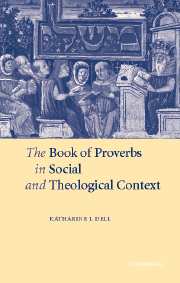Book contents
- Frontmatter
- Contents
- Preface
- List of Abbreviations
- Introduction
- 1 Social context(s) in Proverbs 1–9
- 2 Social context(s) in Proverbs 10:1—22:16
- 3 Social context(s) in Proverbs 22:17—31:31
- 4 Mention of Yahweh in Proverbs
- 5 Theological context
- 6 Echoes of other Old Testament texts and contexts in Proverbs
- Conclusion
- Bibliography
- Index
1 - Social context(s) in Proverbs 1–9
Published online by Cambridge University Press: 22 September 2009
- Frontmatter
- Contents
- Preface
- List of Abbreviations
- Introduction
- 1 Social context(s) in Proverbs 1–9
- 2 Social context(s) in Proverbs 10:1—22:16
- 3 Social context(s) in Proverbs 22:17—31:31
- 4 Mention of Yahweh in Proverbs
- 5 Theological context
- 6 Echoes of other Old Testament texts and contexts in Proverbs
- Conclusion
- Bibliography
- Index
Summary
Proverbs is a slice of a tradition that preceded ancient Israel and continued beyond it. This tradition comprised the creation, reshaping, and transmission of wise sayings and teachings about how to live a righteous, productive, and happy life.
(Fox, 2000: 11)The opening chapters of the book of Proverbs are often regarded as an intentional introduction to the rest of the book. There is what appears to be a mature reflection on the nature of the wisdom enterprise itself that has a character very different from the simplicity of the bulk of sayings contained in the body of the Proverbs text. It is usually regarded by scholars as composed later than the main sayings section, largely because of its more developed theological stance. However, some have argued for an earlier dating for the section, or at least for the presence of older concepts, genres and material within it. I have already mentioned that an important distinction needs to be made, when dealing with the book of Proverbs, between oral and written stages of material. Because of the nature of the book as a collection or series of collections, the likelihood is that some material may have existed and had a context before the one in which it now appears. The quest for the context behind the text in its oral stages has preoccupied some scholars, while others have shown more interest in the later stages of the text's formation–that is, the written stage(s)–and its possible social context among scribes.
- Type
- Chapter
- Information
- The Book of Proverbs in Social and Theological Context , pp. 18 - 50Publisher: Cambridge University PressPrint publication year: 2006



